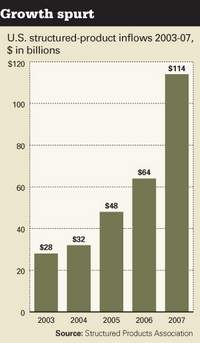The first six months of 2008 ended with U.S. stock markets in the dumps. Now, with the major indexes in or near bear market territory after touching highs in October, hopes for a happier second half are fading fast.
 A toxic brew of sluggish economic growth, rising unemployment, and spiking inflation-otherwise known as stagflation-is prompting market watchers to backpedal furiously on earlier predictions of a rally later this year. Noticeably absent from the discussion are the traditional stock market drivers of strong earnings and interest-rate cuts, neither of which seem to be on the horizon.
A toxic brew of sluggish economic growth, rising unemployment, and spiking inflation-otherwise known as stagflation-is prompting market watchers to backpedal furiously on earlier predictions of a rally later this year. Noticeably absent from the discussion are the traditional stock market drivers of strong earnings and interest-rate cuts, neither of which seem to be on the horizon.Economists, meanwhile, are beginning to tamp down expectations for global growth not only for the rest of this year but for 2009 as well-especially with oil surging to new heights.
All of which is leaving traders tossing around adjectives like "tired," "nervous," and "depressed" to describe the mood heading into the slow July-August months. "The market is in for a rough summer," says Gary Wolfer, chief economist with Univest's Wealth Management & Trust Group, who has been dialing down his once-optimistic outlook for corporate profits. Some pros are even seeking refuge in newfangled instruments known as absolute return barrier notes, designed to protect principal first and allow for capital gains second. In this environment, one can't be too safe.
If history is any guide, investors might need to hunker down for a while. James Swanson, chief investment strategist for mutual fund firm MFS Investment Management, notes that the average bear market lasts 406 days, during which stocks fall 31%, on average. Using that benchmark, we're only halfway through the pain.
Unhappy Anniversary
Much of the malaise, of course, stems from the credit crunch, which will soon mark its one-year anniversary. Banks are expected to notch an additional $600 billion in losses in coming quarters from the mortgage mess and the resulting economic troubles, bringing the total to $1 trillion. They're still ducking for cover: In a recent Federal Reserve survey, 70% of banks had tightened their lending standards for home equity loans.
Whether it's technically a recession or not, it certainly feels like one for many individuals and businesses. Credit-card delinquencies are on the rise, meaning banks will have to set aside money to cover a new round of losses from troubled loans. American Express (AXP), for example, issued a sobering statement on June 25, noting that the business environment in the U.S. continues to weaken as "credit indicators deteriorate beyond our expectations."
That's bad news for the broader stock market. Usually, financials and consumer discretionary stocks lead the way in a recovery, but both sectors are heading south now.
The Philadelphia KBW Bank Index, which tracks banking stocks, was down 34% in the first half of 2008, compared with 12.8% for the Standard & Poor's 500-stock index. And consumer-related companies from Starbucks to Kohl's are reeling.
In fact, few sectors are showing signs of life. Technology-industry analysts are fretting about a slowdown in corporate spending, while health-care stocks are being pummeled on fears of policy changes in Washington after the 2008 election.
On July 2, for example, medical insurer UnitedHealth Group cut its profit outlook for the year. The lone bright spot: energy, especially coal stocks and oil drillers.
With so much uncertainty swirling, some money managers are pushing instruments designed to limit investors' exposure to volatility.
Absolute return barrier notes tie up a wealthy client's money for 18 months. If a specific benchmark, such as the Dow Jones industrial average, stays within a certain range over that period the notes pay a hefty interest rate.
Should the index deviate from the target range, the investor in these sophisticated products doesn't collect the yield, but the principal remains intact. "It's an opportunity to get an above-market return with protection," says Keith Styrcula, chairman of the Structured Products Assn. "You either get everything or nothing but your principal." Given the way the market has been performing, just treading water may be enough for many investors.
For the full Business Week article, click here.




1 comment:
Just read your post and would like to thank you for maintaining such a cool blog and knowledge on selling a business
Post a Comment